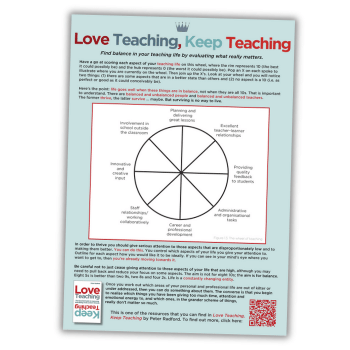Teacher stress – I was signed off because of my mental health and now teach supply

Teacher JL Dutaut speaks honestly about his mental health journey and teacher burnout

- by JL Dutaut

I was driving home – a commute I had been doing for years – and I found myself on a road I didn’t recognise. I didn’t have a clue how I’d got there.
The thought that had been preoccupying me was that if I crashed I’d be able to have some time off. I could catch up with my workload. I’d like to say I imagined the extra time I’d get to be a husband and father, but in all honesty it never crossed my mind.
The crazy thing isn’t that I thought about doing this. The crazy thing is that I know I am not the only one to have thought it.
It wasn’t until I finally found myself in a position to tell my story that I realised how many others have had (and are still having) the same thoughts, across every part of the school system I’ve had the pleasure to interact with. And I get around these days.
Of course, I never did crash my car. Not deliberately.
One morning, on my way to make my first whole-staff Inset presentation, I lost control of my car on a wet road and went into the back of someone. Neither distraction nor desire played any part in that. It was just an accident on an icy road.
But the irony is that I got a day off, and the overarching feeling was not one of relief, but guilt. Nobody was hurt, but I had let the school down. I was told so in no uncertain terms.
Teacher burnout
I knew things were wrong. I knew I wasn’t coping, and that management was failing to deal with it.
I was doing two TLRs for the price of one, and teaching across three subjects in two Key Stages in a school in special measures.
I flagged up that it might be a problem before it even started. I kept flagging it up throughout. Sickeningly, doing so only ever increased my workload.
I had seldom let them down. I was a good teacher, and a perfectionist in terms of my responsibilities. I delivered. I suppose that’s why they kept expecting me to.
Every time I said I was struggling, all I got were unfelt words of encouragement, as if I was just some attention-seeking child; an actor in a melodrama of my own making; as if the problem was really just one of perception.
Every time I managed to get a meeting about my workload, I was made to provide evidence. When I produced a four-page bullet-pointed list of all the things I did to fulfil my TLRs my line manager’s ears finally pricked up.
It’s the hope that kills you – the belief that someone’s finally on your side, that they have the will and the ability to do something about it. When that belief is crushed, the feeling of worthlessness is hard to bear.
How hard it is to bear is entirely proportional to how much you’d needed that hope to keep you going. Nothing happened. The workload just rolled on, measured in periods from one Ofsted monitoring visit to the next, and in numbers of lost colleagues – to illness, to rationalisations, to job moves.
I’m not completely stupid. I loyally fulfilled my duties, but I did try to escape. I made applications, but I never got interviews. The extra work involved in making those applications was often a source of stress, but not as much as the rejections.
There was precious little hope to hang on to.
I never did crash my car, but I crashed nonetheless. Mental health isn’t just mental. We still labour under false assumptions, stereotypes and prejudices in that regard.
Perhaps it gives everyone a false sense of security to assume there’s something wrong with those who suffer, that it’s their fault, that they are somehow badly built on the inside.
Let me burst that bubble. These thoughts didn’t come out of nowhere. They were, in fact, a coldly rational solution to the problems I faced.
I never chose that solution, and was never going to. Nor were they the first symptom. They are just the most shocking – and only by virtue of being shared.
In my mind, the thought of crashing my car was far less shocking than finding myself on a dark road without knowing when or how on earth I had taken a wrong turn. But it was far more worrisome to me than the disrupted sleep and fluctuations in appetite that had long preceded it.
Workplace stress
And so, I was signed off with a post-viral fatigue that had very little to do with mental health, but everything to do with exhaustion. The reaction from the school oscillated between complete silence and phone calls to know if I could come back in for Ofsted. Never a get well card.
I nursed myself back to health as quickly as I could. Before I was ready, I was back at school, but my return to work was botched.
For all the detail I’d provided, and the plan the occupational health ‘therapist’ had copied and pasted – I mean painstakingly drawn up – nobody had read it. I was back in the classroom on day one.
And then came the anxiety – a rational fight-flight-or-freeze response to a threatening situation. The ‘mental’ part of it is only a fraction of it. It is physical, behavioural and cognitive in equal parts.
I was signed off again, and was never able to go back after that.
Supply teaching
And so here I am, one of the 49,000 per year leaving the classroom, bloating the ranks of supply agencies who are the only beneficiaries of this churn-and-burn climate of school accountability.
I can’t bring myself to leave the profession I love, but I can’t bring myself to operate within it on its terms. Even the insecurity and low pay are better than that.
Supply teaching has helped me heal. I’m stronger and a better classroom practitioner than ever, in many respects, and I know I am not alone.
Thinking about why supply appeals more than a secure teaching job is fruitful, but I don’t think we’ll truly come to any solutions until we do the harder work of working out why so many need healing in the first place. How on earth did we end up here?
Jean-Louis Dutaut has taught primary, secondary and FE over the past 13 years. He currently works as a supply teacher and is the co-editor of Flip The System UK: A Teachers’ Manifesto (£16.99, Routledge). Find him on Twitter at @dutaut and visit his website here.










